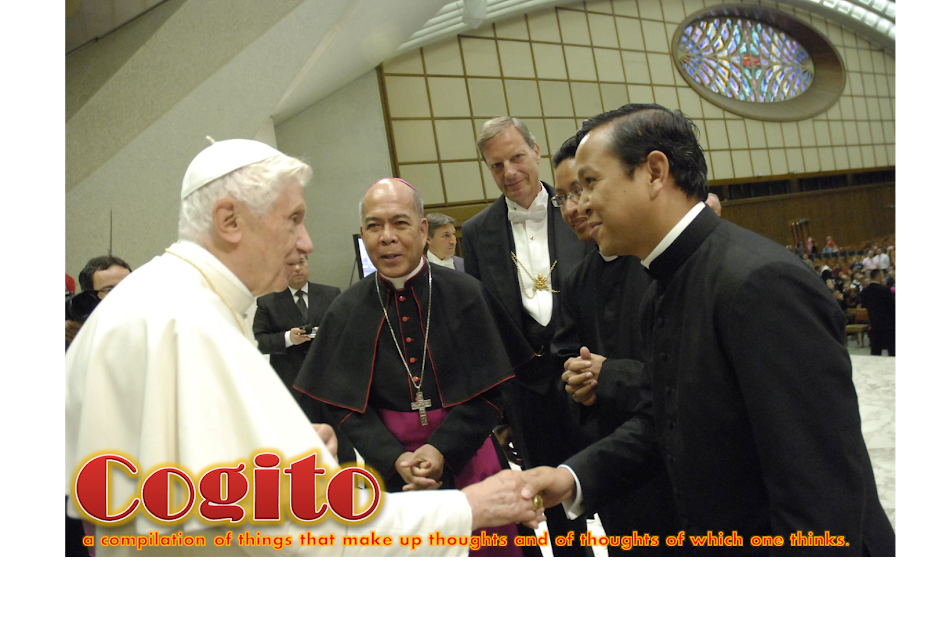
In these last few days, everyone here in Pamplona (those who know that I am from Mindanao) is asking me, “¿Qué está pasando allí en tu tierra?” (What’s going on there in Mindanao?). Full of embarrassment, I simply answered with a deep sigh and asked them to pray hard for my land.
Everybody’s question is: how is it possible for man to plan and execute such a barbaric act? Looking at every detail of it – from the way the victims are abused (especially the women), tortured and killed up to the manner of trying to hide the crime, dumping them on shallow improvised graves – one could make an idea of the abysmal darkness that lurks in the concience of the mastermind.
How is it possible? It is only possible when God is absent in that concience. As the Second Vatican Council teaches, when God is absent in human horizon, not only does man vanish but also he turns against himself; he becomes autodestructive and turns into a beast for his fellowman.
I am one with those who explicitly condemned these brutal killings. I joined the voice of those who cry for justice in behalf of the victims, whose blood – like that of Abel – is clamoring to heaven. Filled with indignation, I also contemplate painfully this heartbreaking incident.
But with a firm grip on my Christian faith, I know “God can write straight with crooked lines” and that, if God allowed this to happened – as He could never will evil things to occur – in the words of St. Paul, “Everything works for the good of those who love the Lord”.
As faithful Christians, what are we to do aside from condemning reasonably the crime and demanding rightly justice? Let us cling to God’s mercy and grab God’s hand more firmly, knowing that all our hope is in God alone. But in saying this, I am not suggesting a certain kind of passive reaction – a mere shrugging of shoulders. Prayer is more efficient and powerful than action.
Let us not content ourselves with condemning this evil act – let us condemn all evil of this kind! I am saying this because it is very scandalizing to hear people and institutions condemning the Maguindanao massacre, yet would not even raise a voice against the rampant abortion happening around the world. I am not diverting attention here, just widening our perspective of what is evil.
Besides, let us not be contented with condemning the evils outside of us – we should not forget to condemn also the evils that we carry within us. Because the evils that we see around are mere reflections of the evils that man – by keeping himself away from God – has succumbed himself to.
We denounce rightly this evil in Maguindanao. But don’t you think we need also to denounce our own personal evils – our sins – in the Sacrament of Confession? Perhaps, in doing so, God will have pity on us and will put an end to these exterior evils. Only when man is purified from his interior evils can the evils of this world be eradicated!
And you might rightfully say, “The perpetrators, the criminals should be the first to purify themselves – confess their crime and suffer the punishment!” That may be the ideal thing. But it is not a matter of who’s to do it first! What’s important is that everyone does what corresponds to him: condemn evil – outside and inside of him.
Perhaps, it is the “straight line” or the “good” that can be gleaned from this horrifying crime. One day, Jesus asked His disciples, “Do you think those people Herod decapitated are more sinful because they have fallen into such a sad fate? Of course, not. But if you will not repent, you too will experience the same.”
Never do we think that the Maguindanao victims are more sinful than us because they suffer such fate. But yes, we agree that what occurred to them is a frightful evil, as frightful as our personal sins. The only true evil, says St. Augustine, is moral evil, that is, our sins. How I wish I could feel as dreadful towards the horror of my sins as I do towards this heinous crime!











